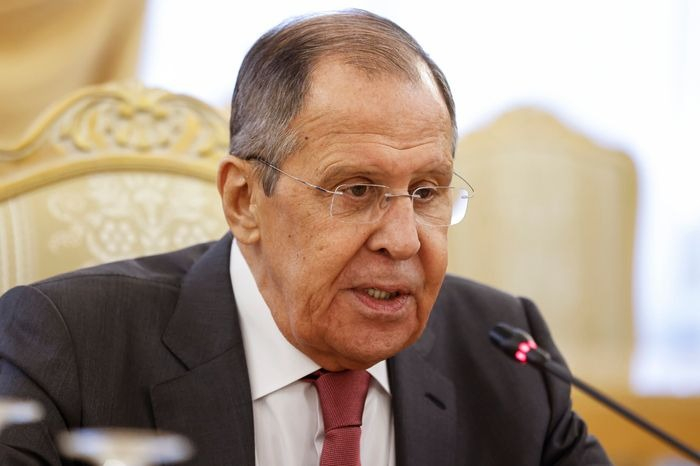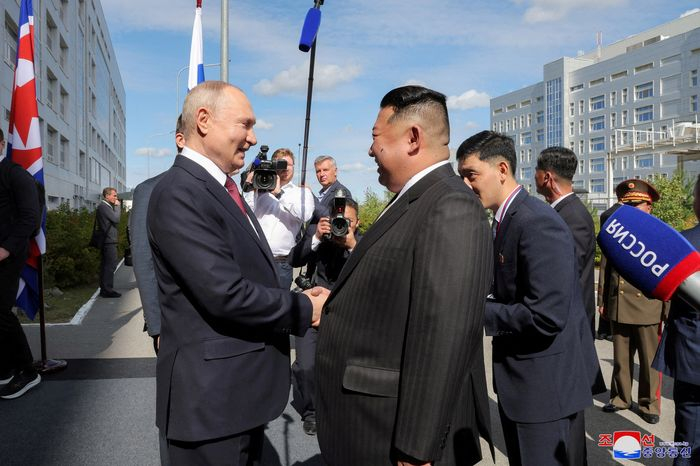Business & Politics
Russia Pushes Security Talks With North Korea, China
Moscow’s top diplomat advocates for the three-way talks to counter U.S. threat
By The Wall Street Journal Oct 26, 2023 (Gmt+09:00)
4
Min read
Most Read
LG Chem to sell water filter business to Glenwood PE for $692 million


Kyobo Life poised to buy Japan’s SBI Group-owned savings bank


KT&G eyes overseas M&A after rejecting activist fund's offer


StockX in merger talks with Naver’s online reseller Kream


Mirae Asset to be named Korea Post’s core real estate fund operator



SEOUL—Russia said it supports holding regular security talks with North Korea and China to address the threat posed by the U.S. on the Korean Peninsula, as Moscow draws closer to its partners and attempts to counter Western isolation.
Russian Foreign Minister Sergei Lavrov backed the idea during his two-day trip to North Korea that ended Thursday, according to Russian state media. Lavrov said Moscow had been pursuing the trilateral dialogue, which would be frequent and unconditional, with both Beijing and Pyongyang, Russia state media reported.
The trip came on the heels of Russian President Vladimir Putin’s visit to China, where he attended a summit celebrating Xi Jinping’s marquee foreign-policy project—the Belt and Road Initiative that Beijing has used to spread its influence abroad. The meeting between the two leaders at the event, with western representatives almost completely absent, highlighted the deep geopolitical divisions that have formed in recent years.
North Korea has yet to comment publicly on the potential for three-way talks with Russia and China.
The Kim Jong Un regime recently provided Russia with 1,000 containers of military equipment and munitions, the U.S. said last week. Subsequent satellite-imagery analysis, conducted by a pair of think tanks, showed that Russia-flagged vessels had made several trips to North Korea in recent months.
In a Thursday meeting, Lavrov and North Korean Foreign Minister Choe Son Hui said they would cooperate in what Russia’s Foreign Ministry described as an effort to ease regional tensions it blamed on the U.S. Lavrov also spoke for about an hour with Kim, North Korea’s 39-year-old leader, according to Russia’s Foreign Ministry.
Kim and Lavrov reached a consensus on ways to cope with the “complicated regional and international situation,” according to a Friday report in North Korean state media, which didn’t provide further details. The two discussed “important matters of mutual concern” about the “complicated regional and international situation,” the report said.
The tighter bonds between Russia and North Korea—two of America’s most defiant and heavily armed rivals—have worried the U.S. and its allies. Chief among the concerns is North Korea’s ability to help replenish Russia’s dwindling supplies for the war in Ukraine.
The Russia-North Korea relationship had largely been transactional in the past, though both countries are pledging deeper strategic alignment. Having more political or military backing from Moscow—which in the past had backed fresh sanctions against North Korea—would be meaningful for the Kim regime, said Go Myong-hyun, a senior fellow at the Asan Institute for Policy Studies in Seoul.
“What Russia can do right now is increase North Korea’s ability to cause trouble,” Go said.
After meeting with Choe on Thursday, Lavrov said Moscow’s improving relations with Pyongyang and Beijing are aimed at strengthening peace in the region. The two also discussed the prospects for trade and economic cooperation and shared concerns over increased military activity by the U.S., South Korea and Japan, according to Russian state media.
Washington, Seoul and Tokyo, whose leaders met at Camp David two months ago, have also grown closer. They have agreed to knit together their missile-radar systems and establish a three-way security hotline. The nuclear-powered USS Ronald Reagan recently docked at a South Korean port city—the latest show of military might aimed at deterring the Kim regime’s missile advances.
Lavrov’s Pyongyang trip marked the latest high-profile exchange between the nuclear-armed nations. Putin and Kim met in Russia’s Far East last month. The summit ended without a written agreement. But Putin accepted Kim’s invitation to visit North Korea.

Since August, Russian-flagged vessels have made at least five trips between a North Korean port and a Russian navy facility, according to separate satellite-imagery analysis conducted by the U.K.-based Royal United Services Institute and the Center for Strategic and International Studies in Washington, D.C.
The containers then were transported by rail across Russia to a munitions-storage facility in the country’s southwest corner, not far from the Ukraine border, according to the reports.
North Korea is likely able to supply 122 mm and 152 mm artillery shells that Russia has burned through during the war, weapons experts say.
Those supply reinforcements, though not modern weaponry, allow Russia to extend fighting with Ukraine, and perhaps buy time for the West to succumb to war fatigue, said Patrick M. Cronin, the Asia-Pacific security chair at the Hudson Institute. “So it is vital because it allows Putin to fight for another day,” Cronin said.
Write to Timothy W Martin and Dasl Yoon at Timothy.Martin@wsj.com
and dasl.yoon@wsj.com
More to Read
-

-
 EconomySouth Korea to boost aid for chipmakers to $23 billion, expanding extra budget
EconomySouth Korea to boost aid for chipmakers to $23 billion, expanding extra budgetApr 16, 2025 (Gmt+09:00)
-
 AutomobilesSouth Korea announces emergency support for auto sector against US tariffs
AutomobilesSouth Korea announces emergency support for auto sector against US tariffsApr 09, 2025 (Gmt+09:00)
-
 EconomyChina says it is aiming to coordinate tariff response with Japan, South Korea
EconomyChina says it is aiming to coordinate tariff response with Japan, South KoreaApr 02, 2025 (Gmt+09:00)
-

Comment 0
LOG IN


